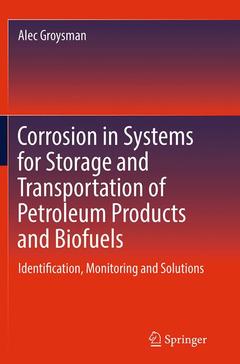Description
Corrosion in Systems for Storage and Transportation of Petroleum Products and Biofuels, 2014
Identification, Monitoring and Solutions
Author: Groysman Alec
Language: English
Subject for Corrosion in Systems for Storage and Transportation of...:
Keywords
Approximative price 168.79 €
In Print (Delivery period: 15 days).
Add to cartPublication date: 09-2016
Support: Print on demand
Approximative price 158.24 €
In Print (Delivery period: 15 days).
Add to cartPublication date: 03-2014
297 p. · 15.5x23.5 cm · Hardback
Description
/li>Contents
/li>Biography
/li>Comment
/li>
This book treats corrosion as it occurs and affects processes in real-world situations, and thus points the way to practical solutions. Topics described include the conditions in which petroleum products are corrosive to metals; corrosion mechanisms of petroleum products; which parts of storage tanks containing crude oils and petroleum products undergo corrosion; dependence of corrosion in tanks on type of petroleum products; aggressiveness of petroleum products to polymeric material; how microorganisms take part in corrosion of tanks and pipes containing petroleum products; which corrosion monitoring methods are used in systems for storage and transportation of petroleum products; what corrosion control measures should be chosen; how to choose coatings for inner and outer surfaces of tanks containing petroleum products; and how different additives (oxygenates, aromatic solvents) to petroleum products and biofuels influence metallic and polymeric materials.
The book is of interest to corrosion engineers, materials engineers, oil and gas engineers, petroleum engineers, chemists, chemical engineers, mechanical engineers, failure analysts, scientists, and students, designers of tanks, pipelines and other systems for storage and transportation fuels, technicians.
The book is of interest to corrosion engineers, materials engineers, oil and gas engineers, petroleum engineers, chemists, chemical engineers, mechanical engineers, failure analysts, scientists, and students, designers of tanks, pipelines and other systems for storage and transportation fuels, technicians.
The book is of interest to corrosion engineers, materials engineers, oil and gas engineers, petroleum engineers, chemists, chemical engineers, mechanical engineers, failure analysts, scientists, and students, designers of tanks, pipelines and other systems for storage and transportation fuels, technicians.
Preface
1 Physico-Chemical Properties and Corrosiveness of Crude Oils and Petroleum Products
2 Fuel Additives
3 Fuel Oxygenates
4 Biofuels
5 Corrosion of Metallic Constructions and Equipment in Petroleum Products
6 Polymeric Materials in Systems for Transportation and Storage of Fuels
7 Corrosion Prevention and Control in Systems Containing Fuels
8 Corrosion Monitoring and Nondestructive Testingin Systems Containing Fuels
9 Cases of Typical and Unusual Corrosion of Tanks
10 History of Crude Oil and Petroleum Products
Appendices
Glossary
Index
Dr. Alec Groysman graduated in 1973 from the Chemico-Technological University named after Mendeleev in Moscow. He received his Ph.D. in physical chemistry and corrosion in 1983 in Moscow. Dr. Groysman has experience in corrosion and protection from corrosion from 1976 in the oil refining industry.
Dr. Groysman deals with kinetics and thermodynamics of corrosion processes, on-line corrosion monitoring, choice and use of corrosion inhibitors, coating systems, selection of appropriate alloys for corrosive conditions, and failure analysis. He has special interests in corrosion education and in the searching of relationships between corrosion, art, history and philosophy.
His first book "Corrosion for Everybody" published by Springer in 2010 received the innovation award winner of Materials Performance Readers` choice in 2012 year in the USA.
Includes a clear explanation why petroleum products and biofuels are corrosive
Describes corrosion control
Addresses monitoring methods in storage and transportation systems of petroleum products
Includes supplementary material: sn.pub/extras

